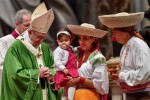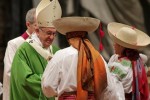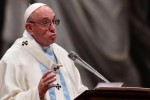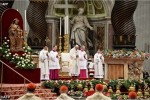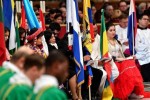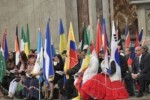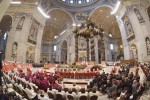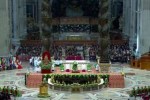2018 (EN)
|
14 January 2018
Tutte le Attività (EN) -
Anno 2018
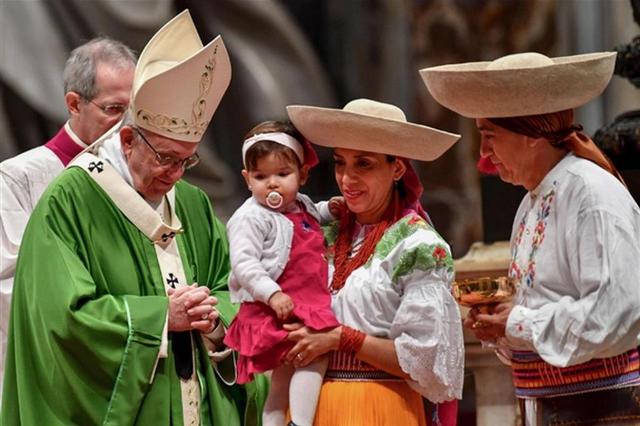
The Fondazione Mediterraneo participated in the celebrations of Rome and Capua with various members involved in solidarity actions and assistance to migrants.
It's exciting to participate in this Eucharist among the flags of 49 countries; in the world there are about one billion people on the move - said President Michele Capasso - almost one human being out of seven; in Italy the migrants arrived through the Mediterranean route in 2017 were 119 thousand, 34% less than last year. It is estimated that there have been 3,116 deaths or missing persons on the Central Mediterranean route from North Africa to Italy. Since the beginning of the year, more than 400 children have died at sea, they tried to cross the crossing alone or with relatives, while in thousands they were victims of abuse, exploitation and slavery on their journey through Libya.
Only in 2017 - Capasso concludes - about 15,000 unaccompanied children reached Italy by sea and their trips were generally managed by traffic and trafficking managers ".Before attending Mass, President Capasso underlined the emotions and involvement of more than 5,000 visitors to the emotional path of the Museum of Peace in Naples dedicated to "VOICES OF MIGRANTS".
Celebrating the Mass in St. Peter's on Sunday, January 14,2018 Pope Francis said words of understanding for people's fears in the face of the migratory phenomenon:"To have doubts and fears is not a sin. The sin is to let these condition our choices and feed hatred "
In fact, precisely in today's homily the Pope said Christian words full of realism, which do not coincide with certain clichés. Commenting on the Gospel, he explained Christ's encounter with the first followers, which the two disciples Andrew and John "asked Jesus:" Where do you stay?", suggesting that their judgment on the master of Nazareth depends on the answer to this question. The response of Jesus:"Come and you will see! opens up for a personal meeting, which provides an adequate time to welcome, know and recognize the other. Welcoming those who are poor and stranger is not an invention of the theology of Marxist liberation, but is what Jesus himself points out as a "protocol" for entering the Kingdom of Heaven. Just as it is also an evangelical fact that God was born in the precariousness of a stable because his family was traveling, and that in the first years of his life the little one born in Bethlehem was taken refuge in Egypt to escape the shakes of Herod's thugs.
But Francis also said something else. First of all, he recalled that "in today's world, for newcomers, welcoming, knowing and recognizing means knowing and respecting the laws, culture and traditions of the countries in which they are welcomed". A significant underlining. And he added that "it also means understanding", on the part of those who arrive, the "fears and apprehensions for the future" of those who welcome. While "for local communities, welcoming, knowing and recognizing means opening up to the richness of diversity without preconceptions, understanding the potential and hopes of newcomers, as well as their vulnerability and fears".
The Pope then continued without dividing the world into good and bad, without drawing caricatures, but showing a clear understanding of the sensitivity of the problems that the current migration phenomenon and its consequences entail. It is not easy - he said - to enter the culture of others, to put oneself in the shoes of people so different from us, to understand their thoughts and experiences. And so often we give up meeting each other and raise barriers to defend ourselves. The local communities, sometimes - noted Francis - are afraid that the newcomers disturb the established order,"ruby" something of what has been painstakingly built ". The Pope therefore noted that "even the new arrivals have fears: they fear confrontation, judgment, discrimination and failure".
All these fears, Bergoglioconcluded,"are legitimate, based on doubts fully understandable from a human point of view. Having doubts and fears is not a pity. Sin is, he added,"letting these fears determine our responses, influence our choices, compromise respect and generosity, feed hatred and rejection. The sin is to renounce the encounter with the other, with the different, with our neighbour, who is in fact a privileged opportunity to meet the God ".






